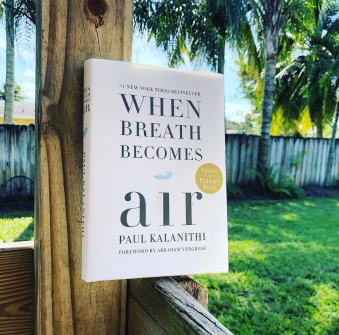
Rating: 5/5 Stars
The novel “When Breath Becomes Air” was written by neurosurgeon, Paul Kalanithi. This autobiography details his experience as a young medical professional who is diagnosed with a form of terminal cancer. The book covers his interactions with patients as the healthcare provider but also illustrates him as a patient himself battling this unforgiving disease.
Paul’s work speaks directly to humanity of medicine. Oftentimes doctors and nurses forget what it feels like to be on the other side of the mortality conversation. Understandably, medical professionals can become numb to the cruel and unforgiving nature of a terminal diagnosis. It is almost as if this book was written as a preventative treatment for this disconnect between patients and health care providers. The writing vividly describes the process for both practitioners and patients alike and bridges the gap between both parties allowing for better understanding and collaborative support.

“When Breath Becomes Air” is written with beautiful precision and eloquence. Paul Kalanithi’s voice allows the reader full immersion into his life, and enables the reader to learn alongside the author. I found the book to be an honest portrayal. There are some situations that the author details which may paint him in a more negative light and others may have avoided recording. However, Kalanithi chooses to write about these occurrences with bravery and honesty which emphasizes the uniqueness of this book.
It is important to note that the last section of the book was authored by Paul Kalanithi’s widow after his death. I found this section to be exceptionally moving and a vital component to Paul’s story. A word of caution though, the end of the book did have me breaking down into tears more than once, so readers may want to prepare with tissues.
Recommendations: This autobiography is a must read. It is a beautifully written analysis of life, death and what it means to be human. In addition, I believe that all medical professionals should read this during their educational training. It touches on the critical art of patient care and communication that can so easily be overlooked and forgotten. Pick up this one, it will stick with you long after you have finished reading it.
Savor this one. Life is short.
Sounds like a tear jerker
It really was. It was so good though and completely worth reading!